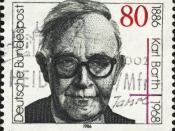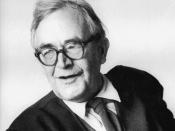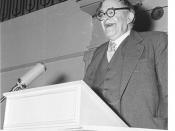On the surface, what is human is easy to define. Humans are a species of advanced mammal marked by an advanced society and cultures. However, below the surface, there is a much deeper meaning of humanity and what it is to be human. Karl Barth in The Basic Form of Humanity gives his Christian interpretation of the notion of humanity in much deeper detail than WebsterÃÂs dictionary. Likewise, John Makransky in Awakening Through Love gives us a similar interpretation of the idea of authentic human person hood from the Buddhist perspective. Despite the fact that Karl Barth and John Makransky are scholars of two different religions, their views of humanity and its innate capacity for goodness are surprisingly similar.
A celebrated Christian theologian, Karl Barth explicitly answers, from a Christian perspective, the question of what is true humanity. According to Barth, real humanity is a ÃÂbeing in encounterÃÂ or an interaction between persons that consists of four activities: Seeing and being seen; Being in mutual speech and hearing; Being in mutual assistance; and being in happiness.
By defining these four elements, Barth has essentially defined the essence of authentic humanity.
The first mark of humanity ÃÂseeing and being seenÃÂ, is the basis of the other three marks of humanity. For without acknowledging the other and oneself first, one cannot go on to dialogue and assist with the other, as well as oneself. By ÃÂseeing and being seenÃÂ, Barth is speaking of face to face interaction, and looking the other in the eye, as well as letting them look you in the eye in the deepest meaning of the phrase. By ÃÂnot refusing to know others or being afraid to be known by themÃÂ, Barth says is a true mark of humanity. Conversely, being shut off from others in isolation and refusing to know others are marks of inhumanity. The notion of this mutual acknowledgement Barth says is ÃÂin some sense of the root-formation of all humanity without which the rest is impossible.ÃÂOnce one has acknowledged the other, a second mark of human existence is being in mutual speech and hearing. The speech that Barth speaks of is not simply two people talking to each other, but two people talking with each other. By talking with each other there should be a genuine conversation in which one is speaking sincerely and on the deepest level, and the other is acknowledging the speakerÃÂs ÃÂself-declarationÃÂ through their listening and genuine attempt to understand the speaker. Barth says that this is a two way process in which the one and the other must both take their turn as the speaker and listener. Through this process, we get to know our fellow man and their ÃÂworldÃÂ.
Beyond acknowledgement and dialogue, the next step for humanity is being in mutual assistance. As creatures of God, men, we are destined to need help at some point in our lives. Calling out for help, as well as receiving help when we call out for it Barth says is a true mark of Humanity. By being in mutual assistance, one must be truly concerned for life of the other even though that life is not their own. Barth states that we cannot live our lives without help from others, and for this reason, it is oneÃÂs duty to actively help the other when they are struggling.
The final step of humanity is achieving the first three with profound gladness. ÃÂWe gladly see and are seen; we gladly speak and listen; we gladly receive and offer assistance.ÃÂ By engaging with the other in acknowledgment, speech, and assistance with the mindset of gladness, we can truly be seen as human.
Essentially, Barth views human, and thus humanity as an interaction between one and the other. Without this interaction, one is not human. One example of this that came to mind while reading the Barth selection is an inmate in solitary confinement. There are numerous examples of people losing their minds while spending time in solitary confinement; losing what they have left of their humanity. This coincides with BarthÃÂs evaluation of humanity. Without interpersonal interaction, one can easily lose their sense of humanity.
Barth states, ÃÂThe man who is not the fellow of others is no real man at allÃÂ, which sums up his take on humanity, but there is also another sense of humanity that Barth implies. As he has defined human as being tied to person-to-person relationships, the relationship to God is also necessary for humanity. When speaking of a man who has totally isolated himself from others and turned to sin, Barth says, ÃÂeven as he denies it, his creaturely nature stands in the light of the humanity of Jesus, and it is bright in this lightÃÂ. Here, he is essentially saying that despite having entirely turned to sin, there is still a hope for turning back to the light, to Jesus. In Eberhard BuschÃÂs The Great Passion, he interprets this as, ÃÂThe true and real human is neither the human nor the sinner in and of himself, but rather the human as God in Jesus Christ sees him, creates her, ensures that he cannot be lost.ÃÂ In essence, as a creature of God, we will always have a piece of the wholly good spirit of God within in us.
It is this last notion that as humans we have an inherent capacity for goodness that is the basis for John MakranskyÃÂs view of humanity. From a Buddhist perspective, this notion that all human beings have at least some inherent goodness is an important concept in Buddhism. MakranskyÃÂs word for this is Buddha nature. He defines Buddha nature as ÃÂour hidden capacities of unconditional love and wisdomÃÂ. A goal for Makransky in his book is to cultivate this seed of Buddha nature to grow into a more authentic sense of reality, and therefore a higher form of humanity.
The pesticide that prevents the seed of Buddha nature from growing is our self-centered perceptions of reality. In Awakening Through Love, Makransky gives the reader a guide to attaining higher capacities for love, compassion, and wisdom. The first step in cultivating oneÃÂs inner Buddha nature is accepting love from others. Next one must gain some perspective on the ÃÂpure nature of the mindÃÂ which Makransky compares to a ÃÂboundless sky pervaded by sunlightÃÂ. By realizing pure perception is something without shape, color, center, or boundaries; ÃÂlimitless emptinessÃÂ, one can further realize the error of oneÃÂs misinterpreted perceptions of reality. This deeper understanding of reality as such naturally fosters love and compassion toward others. By accepting and extending this love beyond boundaries, one is able to see good in all situations and the Buddha nature in all people.
By examining Karl Barth and John MakranskyÃÂs work, a significant similarity becomes apparent. Despite coming from the two distinct religions of Christianity and Buddhism, both authors conclude that there is some inherent goodness in humankind. Barth conveys this message by saying, ÃÂEven the sinful man who denies his humanityÃÂ stands in the light of the humanity of JesusÃÂ. In the same token, Makransky states that we have ÃÂhidden capacities of unconditional love and wisdom (Buddha nature)ÃÂ that are ÃÂthe beginning of authentic refuge in the intrinsic goodness of beingÃÂ. While they describe it in different terms, Barth in terms of the light of Jesus Christ, and Makransky in oneÃÂs Buddha nature, both are giving the reader essentially the same message; there is good within humanity.
While most of the time, it is not the good in humanity that shines through, it is there, and it is attainable. Barth suggests interpersonal interaction coupled with interaction between man and God as a way to become more human and spread the goodness in humanity. Makransky suggest that by accepting love, attaining the right mindset, and loving without boundaries, one encourages the cultivation of good throughout humanity. By examining both authorÃÂs views of humanity and its innate capacity for goodness, it seems that they are in agreement despite coming from different religious backgrounds.
Works ReferencedBarth, Karl. Church Dogmatics Volume III Part 2: The Doctrine of Creation. 1960.
Busch, Eberhard. The Great Passion: An Introduction to Karl Barth's Theology. Grand Rapids, Michigan: William B. Eerdmans Publishing Company, 2004.
Makransky, John. Awakening Through Love: Unveiling Your Deepest Goodness. Somerville, MA: Wisdom Publications, 2007.





